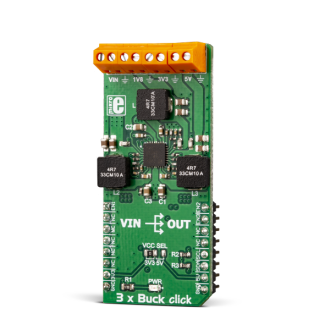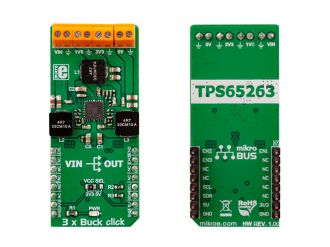
We strongly encourage users to use Package manager for sharing their code on Libstock website, because it boosts your efficiency and leaves the end user with no room for error. [more info]

Rating:
Author: MIKROE
Last Updated: 2018-10-26
Package Version: 1.0.0.0
mikroSDK Library: 1.0.0.0
Category: Buck
Downloaded: 5761 times
Not followed.
License: MIT license
3xBuck click is a triple step-down (buck) converter Click board. It features three independent output terminals that can provide 1.8V, 3.3V, and 5V with the combined current output up to 3A.
Do you want to subscribe in order to receive notifications regarding "3 x Buck click" changes.
Do you want to unsubscribe in order to stop receiving notifications regarding "3 x Buck click" changes.
Do you want to report abuse regarding "3 x Buck click".


Library Description
The library initializes and defines the I2C bus driver and drivers that offer a choice for writing data in registers and reading data from registers. The library includes functions for set output voltage, enable and disable buck, configuration buck and read buck status.
Key functions:
void c3xbuck_enableBuck(uint8_t buck) - Function for enable Buckvoid c3xbuck_setVoltage(uint8_t buck, uint8_t voltage) - Function for set output voltagevoid c3xbuck_configurationBuck(uint8_t buck, uint8_t config) - Function for configuration buckExamples description
The application is composed of the three sections :
void applicationTask()
{
c3xbuck_setVoltage(_C3XBUCK_SELECT_BUCK_1, _C3XBUCK_OUTPUT_VOLTAGE_1000mV);
c3xbuck_setVoltage(_C3XBUCK_SELECT_BUCK_2, _C3XBUCK_OUTPUT_VOLTAGE_1250mV);
c3xbuck_setVoltage(_C3XBUCK_SELECT_BUCK_3, _C3XBUCK_OUTPUT_VOLTAGE_1500mV);
Delay_ms( 5000 );
c3xbuck_setVoltage(_C3XBUCK_SELECT_BUCK_1, _C3XBUCK_BUCK_DEFAULT_OUTPUT_VOLTAGE);
c3xbuck_setVoltage(_C3XBUCK_SELECT_BUCK_2, _C3XBUCK_BUCK_DEFAULT_OUTPUT_VOLTAGE);
c3xbuck_setVoltage(_C3XBUCK_SELECT_BUCK_3, _C3XBUCK_BUCK_DEFAULT_OUTPUT_VOLTAGE);
Delay_ms( 5000 );
}
Other mikroE Libraries used in the example:
Additional notes and information
Depending on the development board you are using, you may need USB UART click, USB UART 2 click or RS232 click to connect to your PC, for development systems with no UART to USB interface available on the board. The terminal available in all MikroElektronika compilers, or any other terminal application of your choice, can be used to read the message.